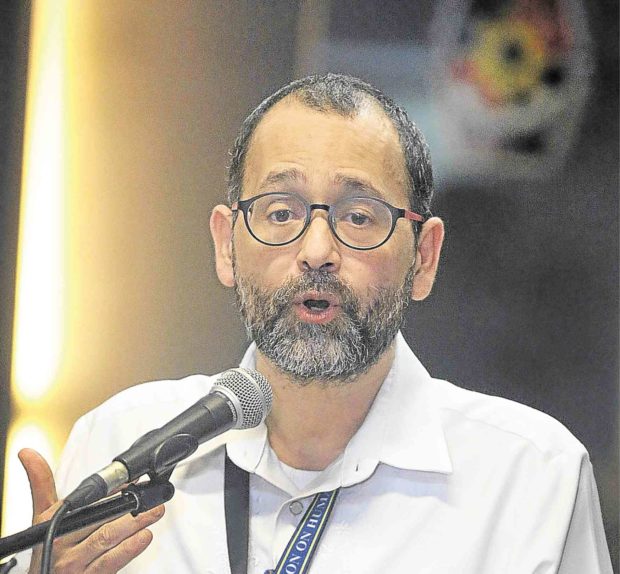CHR chief ready to work with ICC in EJK probe
Commission on Human Rights (CHR) Chair Chito Gascon on Saturday said his agency was ready to work with the International Criminal Court (ICC) as it investigates the thousands of killings carried out in the Duterte administration’s bloody war on drugs.
A fierce critic of police methods in dealing with drug offenders, Gascon also urged the Philippine National Police and the Department of Justice to cooperate with the ICC.
The international court has readied its “preliminary examination” into whether President Rpdrogp Duterte committed a crime against humanity in conducting his brutal crackdown on drugs.
ICC Prosecutor Fatou Bensouda announced earlier this week that her office would analyze the alleged extrajudicial killings (EJK) carried out since July 1, 2016, when Mr. Duterte took office.
The ICC is acting on the complaint filed in April 2017 by lawyer Jude Sabio, counsel of confessed Davao Death Squad member Edgar Matobato, against the President.
Article continues after this advertisement‘Mass murder’
Article continues after this advertisementIn the complaint, Mr. Duterte is accused of ordering the “mass murder” of nearly 4,000 drug suspects by police as well as by vigilantes working for the authorities. But rights groups say the actual toll is three times that number.
“The CHR is ready, if requested, to assist in any way with the process of preliminary examination. The government, as a party to the Rome Statute, is duty-bound to fully cooperate with the ICC,” Gascon said in a statement.
Gascon’s comments came after Mr. Duterte on Friday declared himself beyond the jurisdiction of the probe, saying that while a previous administration had ratified the treaty establishing the ICC, it had not become local law because of a technicality.
The President also issued a veiled warning to Prosecutor Bensouda, telling her: “Do not go into that adventure. It’s a messy one. You will know. You will get your comeuppance.”
Mr. Duterte has publicly called on police to kill drug suspects who violently resist arrest while vowing to protect officers from prosecution, maintaining the anticrime operations are tough but legitimate.
The CHR has also sought to investigate the drug war killings but has been hampered by a lack of cooperation from other government agencies like the PNP, as well as limited resources.
Angered by the CHR’s criticism of Mr. Duterte’s drug war, the President’s congressional allies last year tried to slash its budget to just P1,000 until a public outcry forced them to reverse the move.
The ICC’s initial inquiry is designed to help prosecutors determine if there is enough evidence of crimes that fall into its jurisdiction. It could lead to a full probe and eventually charges.
Infamous individuals
In being the subject of a preliminary examination, Mr. Duterte is now in the dubious company of “national leaders and military commanders in the worldwide roster of infamous individuals ensnared under the jurisdiction of the ICC,” said Albay Rep. Edcel Lagman.
The opposition lawmaker said the list of brutal and violent leaders included slain Libyan strongman Muammar Gaddafi and Ivory Coast President Laurent Gbagbo, who is on trial on four counts of crimes against humanity.
“The ICC is determined to investigate and prosecute those alleged to have committed crimes against humanity, including summary executions against civilians leveled against Duterte,” Lagman said in a statement.
He said the state policy of eradicating the drug menace “neither justifies nor condones the extermination of civilian suspects without due process.” —Reports from AFP and DJ Yap
